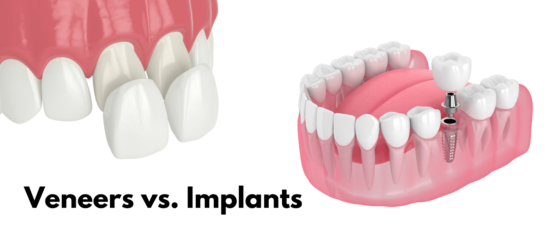
If your smile requires replacement, repair or enhancement, there are a few different methods that you can explore. Dental implants or veneers are two worthwhile options. Whereas both benefit your oral health, they fulfill different needs so your choice would depend on what you need and the results you are looking for.
To help you decide, we invite you to contact our dentist in Millwoods today. They will explain each treatment in depth and address any queries you have.
Looking Closely at Dental Implants
Though they help improve the appearance of your smile, implants are primarily permanent teeth replacements. Dental experts recommend this solution to patients missing one or multiple teeth.
Implants are prosthetics designed from titanium and porcelain. Three smaller components attach to create a single implant that can be inserted into your jaw. This includes the screw, abutment, and the prosthetic.
The screw functions as a replacement tooth root. It is inserted into the space where a missing tooth once was. Over a few months, it will fuse with your bone material to create a solid basis for your smile. The abutment attaches the screw to the prosthetic, which is commonly a dental crown.
To see if you are a good fit for the treatment, your dentist will evaluate your smile. Ideal candidates have a healthy jawbone. If this is not the case, a bone graft procedure may be needed beforehand.
The Pros and Cons of Implants
Every treatment has benefits and drawbacks; knowing these will help you feel more at ease before visiting a dentist near you.
Pros
- They look and feel natural – Dentists and oral surgeons ensure that every implant a patient receives fits comfortably in their mouth. Due to bonding with your bone, it will not wiggle around or fall out. This means you can eat and talk as you would every day.
- Easy to care for – Since dental implants in Millwoods are made to function like natural teeth, they are easy to look after. You can brush and floss them without issue.
- Made to last – With the proper upkeep, implants can last nearly a lifetime. Therefore, you will not need to worry about replacing them, which saves you money and from worrying.
Cons
- Surgery is required – Dental implantation is a surgical process that requires a time commitment. At least two appointments are needed to place each piece of the implant. This also means that your mouth will need some time to heal before the rest of the treatment can continue.
- Can be costly – While implants are often considered the gold standard of restorative dentistry, this comes with a price tag. On average, this treatment costs anywhere from $1,000 to $6,000. Make sure you talk to your insurance provider if you have coverage or your dentist to arrange a payment schedule.
- Crown replacement – Unlike the implant screw and abutment, dental crowns are not indestructible. Porcelain crowns can last up to 10-15 years but are still susceptible to daily wear and tear. Eventually, they may need to be replaced.
A Detailed Look at Dental Veneers
Dental veneers are unique because they can be considered a cosmetic or restorative treatment used as a solution for making teeth more aesthetically pleasing. They are tooth-colored shells used to cover up flaws in your smile.
Porcelain or ceramic are the most popular materials used to fabricate veneers. Both are durable and closely mimic the appearance of a patient’s natural tooth. No one will be able to tell the difference.
Dental veneers are best suited for patients who want to address minor imperfections, such as chips or cracks, small gaps between teeth, stains, and teeth that are slightly crooked. If you are dealing with more serious problems like overcrowding or fragmentation, your dentist will advise a more advanced treatment like orthodontic therapy.
The process of getting veneers is straightforward. After your smile has been examined, your dentist will create impressions of your teeth. These molds are delivered to a lab where the veneers are created according to your color preference and oral dimensions. A small amount of enamel is scraped off from the surface of your teeth; this permits the shells to stay in place. Once made, they will be bonded in place with dental cement.
Pros and Cons Veneers
Below are the various advantages and disadvantages of getting dental veneers in Millwoods. If you have questions about this service, call your dentist today.
Pros
- Stain resistant – Veneers are quite resistant to residue left by food, drink, and tobacco than your natural teeth. This helps them look both flawless and natural for years to come.
- Low maintenance – You will need to look after your veneers just like your natural teeth, but you do not need to worry about any extra measures. Brushing, flossing, and routine checkups and cleanings will help keep your veneers sparkling.
- Improved self-esteem – Our smile says a lot about us, and when you have a beautiful new smile, you will feel more confident in yourself, your abilities, and meeting new people.
Cons
- Enamel removal – Etching a bit of your enamel does not harm your teeth, but it cannot be reversed.
- Not covered by insurance – Cosmetic dentistry is not usually covered by dental insurance, meaning this treatment must be paid out of pocket. A single tooth veneer can cost between $500 to $2,000.
- Increased sensitivity – Patients can sometimes experience increased tooth sensitivity when consuming hot or cold items due to enamel loss.
So, Which Treatment is Best?
No dental treatment is perfect; what works well for one patient may not be ideal for another. Your smile goals, the current state of your oral health, the cost, and what your dentist advises all influence which treatment is best for you.
Doing your research and booking a consultation with your dentist to gather as much information as possible before committing to anything will help you make a choice that you will feel good about for years to come.
Here at Agape Dental Clinic, we provide general, cosmetic, and restorative care. Contact our team today to take the first step of your dental journey. We are eager to meet with you soon!

